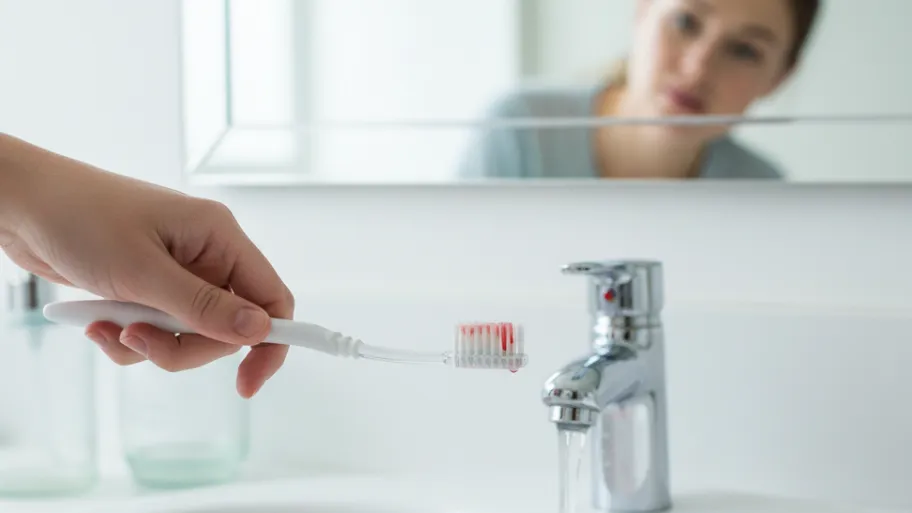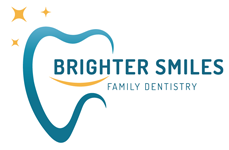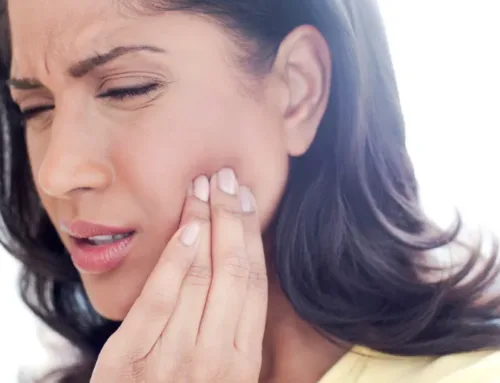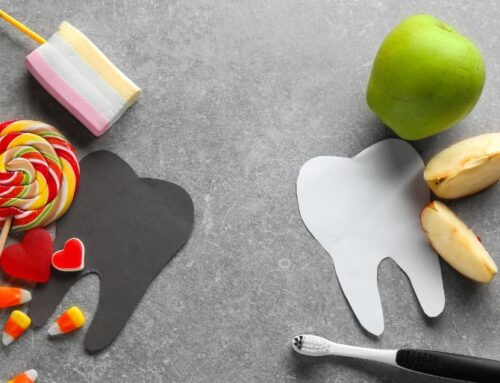Seeing your gums bleed during brushing or flossing often raises concern. If you’re wondering why your gums bleed, you’re in the right place.
At Brighter Smiles Family Dentistry in West Des Moines, we often meet patients who worry about bleeding gums and want to know if it’s something serious — or just a sign they need to adjust their routine.
This guide will walk you through the most common bleeding gums causes, how to care for them on your own, and when visiting a dental professional is the smartest step.

By the end, you’ll know how to handle bleeding gums confidently and keep your smile healthier.
Let’s start with the quick answer most people are searching for: why do my gums bleed?
Quick Navigation: What You’ll Learn in This Guide
Quick Answer — Why Do My Gums Bleed?
Gum bleeding usually happens for a few common reasons:
In most cases, it’s a sign your gums are irritated or starting to develop early gum disease.
Common Causes of Bleeding Gums
Bleeding gums don’t happen for just one reason — there are several everyday factors and health-related issues that can play a role.
In this section, we’ll break down the most common causes in more detail so you can understand what might be behind the bleeding you’re noticing.
1. Gum Disease (Gingivitis and Periodontitis)
The most common reason gums bleed is gum disease. Gingivitis is the earliest stage, where plaque irritates the gumline, making it red, swollen, and prone to bleeding.
When gingivitis is ignored, it can turn into periodontitis, a deeper infection that weakens bone support and increases the chance of losing teeth.
Spotting gum bleeding early and treating it is the best way to prevent long-term damage.
2. Brushing or Flossing Too Hard
Sometimes gum bleeding isn’t from disease at all — it’s from technique. When brushing or flossing is too harsh, it puts stress on delicate gum tissue and leads to bleeding.
Many people notice bleeding gums when brushing right after switching to a firmer toothbrush or starting a new flossing routine. A softer touch and the right tools usually make a big difference.
3. Poor Oral Hygiene Habits
When brushing and flossing aren’t done consistently or thoroughly, plaque hardens into tartar and irritates the gums.
Even missing spots around the back teeth can trigger inflammation and bleeding. Small daily lapses can quickly build up into gum problems over time.
4. Medications That Affect Gums
Certain medications can make gums more likely to bleed.
Blood thinners, for example, reduce clotting, while some drugs for high blood pressure or seizures can cause gum tissue changes.
If you’re on a prescription and notice gum bleeding, it’s worth mentioning to both your doctor and dentist.
5. Vitamin Deficiencies (C & K)
Your gums need nutrients to stay healthy. Not getting enough vitamin C can make gums fragile and slower to repair, while low vitamin K reduces your blood’s ability to clot properly.
These deficiencies aren’t as common today, but when they happen, bleeding gums can be one of the first signs.
6. Smoking or Vaping
Tobacco products make gums weaker and less able to fight off infection. Vaping can have similar effects because of the chemicals involved.
By limiting healthy blood flow, smoking and vaping make it easier for gums to get irritated and bleed — and harder for them to heal without proper care.
7. Poor Diet and Stress
Your daily habits can also take a toll. Diets high in sugar feed the bacteria that cause gum problems, while ongoing stress weakens your immune system.
Together, these factors make gums more sensitive and likely to bleed.
8. Other Health Conditions
Sometimes gum bleeding points to a bigger health issue.
Diabetes can make infections harder to control, pregnancy hormones may make gums more sensitive, and even a misaligned bite can create uneven pressure that irritates gum tissue.
If gum bleeding is frequent and you have one of these conditions, it’s especially important to stay on top of dental care.
How to Stop and Treat Bleeding Gums
Knowing the causes is only half the picture — the next step is learning how to treat bleeding gums so they can heal and stay healthy.
Some fixes are simple enough to start at home, while others require professional care. Here’s what you can do.
At-Home Care Tips: How to Stop Bleeding Gums
These small habits can reduce bleeding and strengthen your gums over time.
Professional Treatments Your Dentist May Recommend
If at-home care isn’t enough, dentists have proven ways to restore gum health. Professional options for how to treat bleeding gums include:
When simple steps don’t resolve the problem, these treatments are the most reliable way to fix bleeding gums and protect your oral health long term.
What Happens If You Ignore Bleeding Gums?
Bleeding gums may seem minor, but leaving them untreated can lead to bigger problems.
Ongoing irritation often develops into gum disease, which can damage supporting bone, cause teeth to loosen, and even affect overall health.
Addressing gum bleeding early keeps your smile — and your body — healthier in the long run.
Prevention: How to Keep Gums Healthy
Once you’ve learned how to stop bleeding gums, the next step is making sure they stay strong and healthy for the long run.
Preventing gum problems isn’t about complicated routines — it’s about keeping up with small, consistent habits that protect your smile every day.
- 1
Brush with care and consistency. Twice-a-day brushing with a soft-bristled brush helps remove plaque before it irritates the gums.
- 2
Floss gently but regularly. Even careful brushing misses spots between teeth. Daily flossing keeps these hidden areas clean and reduces irritation.
- 3
Choose a gum-friendly diet. Vitamin-rich foods like leafy greens, citrus fruits, and crunchy vegetables support gum health, while limiting excess sugar helps prevent buildup that harms the gums.
- 4
Stay on top of stress. Stress puts added strain on your immune system, which lowers its ability to fight bacteria and leaves gums more vulnerable to irritation. Taking time to relax benefits both your body and your smile.
- 5
Avoid smoking and vaping. Both restrict blood flow to the gums and slow healing, leaving them more vulnerable. Quitting makes a noticeable difference in gum health.
- 6
See your dentist regularly. Professional cleanings and checkups catch early signs of gum problems and keep your oral health on track.
Healthy gums aren’t just about preventing bleeding — they’re key to keeping your whole mouth in good shape. Small daily steps, plus regular dental visits, can make a lasting difference.
When to See a Dentist About Bleeding Gums
If you’ve tried home care and still wonder how to fix bleeding gums, it may be time to see a dentist.
Occasional bleeding might not be urgent, but gums that bleed often or don’t improve are a sign something deeper is going on.
Consider scheduling a dental visit if you notice:
Seeing a dentist isn’t only for emergencies.
Professional care can catch gum disease early, treat underlying issues, and prevent long-term damage.
Getting help sooner rather than later keeps gum problems from worsening and also supports the long-term health of your whole mouth.
FAQs About Bleeding Gums
Brighter Smiles Can Help Treat and Prevent Bleeding Gums
If you’re still noticing gum bleeding and wondering what to do next, the safest step is to see a dentist you can trust.
At Brighter Smiles Family Dentistry in West Des Moines, we understand how concerning bleeding gums can be. That’s why our team focuses on gentle, modern care that addresses the problem at its source and helps prevent it from coming back.
Whether you need a routine cleaning, gum disease treatment, or a personalized exam to uncover the cause, we’re here to help restore your gum health — and your peace of mind.
👉 Don’t wait for bleeding gums to get worse. Call Brighter Smiles Family Dentistry today to schedule your checkup or gum health assessment in West Des Moines.

About the Author
Brighter Smiles Family Dentistry, led by Dr. Melani Fulton, upholds a legacy of exceptional dental care in West Des Moines, IA. Dr. Fulton, a University of Iowa College of Dentistry alumna, specializes in family dentistry and orthodontics. She succeeded Dr. Dan Todd in 2021, continuing a tradition of patient-centered, high-quality dentistry. Committed to gentle, modern treatments, Dr. Fulton’s approach is deeply rooted in community values, ensuring every patient feels like family at Brighter Smiles.




